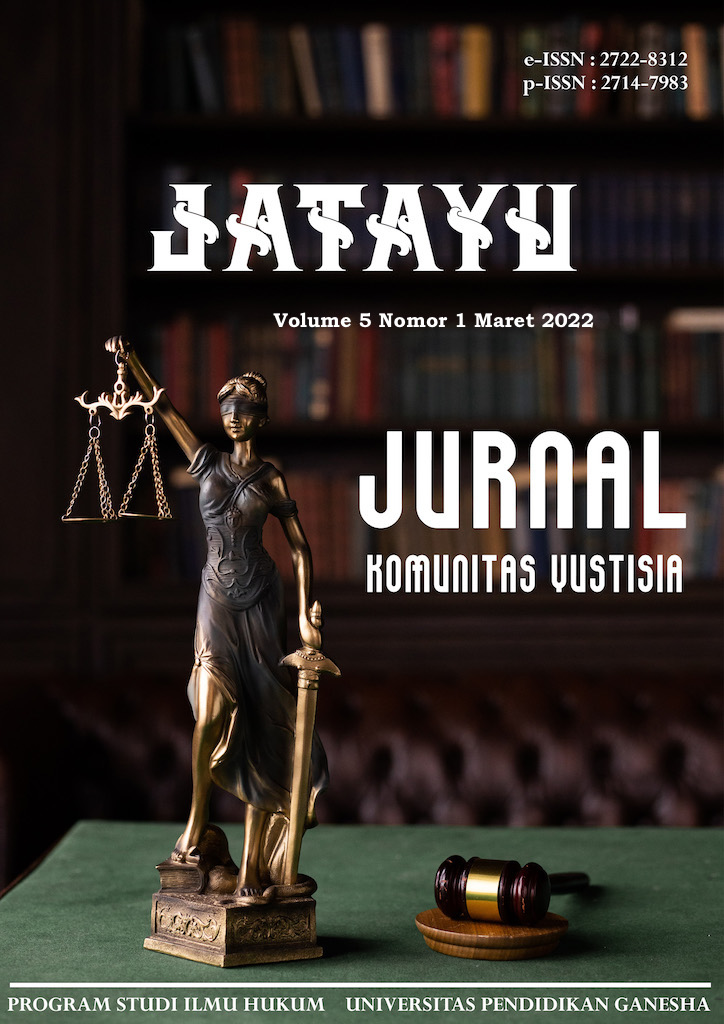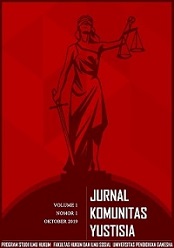TINJAUAN YURIDIS PENERAPAN PRINSIP RESTORATIVE JUSTICE TERHADAP TINDAK PIDANA KORUPSI DALAM RANGKA PENYELAMATAN KEUANGAN NEGARA
DOI:
https://doi.org/10.23887/jatayu.v5i3.51892Keywords:
Restorative Justice, Tindak Pidana Korupsi, Pengembalian Kerugian Negara.Abstract
Penelitian ini bertujuan untuk (1) Menganalisa bagaimana penerapan konsep restorative justice dalam hukum pemberantasan korupsi guna menguatkan tujuan pengembalian kerugian negara oleh pelaku tindak pidana korupsi yang akhir-akhir ini semakin meningkat (2) Mengetahui apakah konsep restorative justice dalam tindak pidana korupsi dapat diterapkan dalam hukum Indonesia. Adapun jenis penelitian yang digunakan adalah penelitian hukum normatif atau penelitian hukum kepustakaan, yaitu penelitian hukum yang dilakukan dengan cara meneliti bahan pustaka (library research), dengan pendekatan peraturan perundang undangan, pendekatan konsep dan pendekatan analisis. Hasil penelitian menunjukan bahwa (1) Penerapan konsep restorative justice dalam tindak pidana korupsi guna menguatkan tujuan pengembalian kerugian negara oleh pelaku tindak pidana korupsi dapat dilihat melalui Surat Edaran Jaksa Agung Muda Pidana Khusus Nomor: B113/F/Fd.1/05/2010 tanggal 18 Mei 2010 dan Surat Kapolri No. Pol. B/3022/XII/2009/sdeops tentang konsep Alternatif Dispute Resolution (ADR) (2) Secara teroritis dan secara yuridis konsep restorative justice dalam tindak pidan korupsi dapat di terapkan dalam hukum Indonesia.
Downloads
Published
Issue
Section
License

This work is licensed under a Creative Commons Attribution-ShareAlike 4.0 International License.
Authors who publish with this journal agree to the following terms: Authors retain copyright and grant the journal right of first publication with the work simultaneously licensed under a Creative Commons Attribution License that allows others to share the work with an acknowledgement of the work's authorship and initial publication in this journal. Authors are able to enter into separate, additional contractual arrangements for the non-exclusive distribution of the journal's published version of the work (e.g., post it to an institutional repository or publish it in a book), with an acknowledgement of its initial publication in this journal. Authors are permitted and encouraged to post their work online (e.g., in institutional repositories or on their website) prior to and during the submission process, as it can lead to productive exchanges, as well as earlier and greater citation of published work (See The Effect of Open Access). Authors who publish with this journal agree to the following terms: Authors retain copyright and grant the journal right of first publication, with the work [SPECIFY PERIOD OF TIME] after publication simultaneously licensed under aCreative Commons Attribution License that allows others to share the work with an acknowledgement of the work's authorship and initial publication in this journal. Authors are able to enter into separate, additional contractual arrangements for the non-exclusive distribution of the journal's published version of the work (e.g., post it to an institutional repository or publish it in a book), with an acknowledgement of its initial publication in this journal. Authors are permitted and encouraged to post their work online (e.g., in institutional repositories or on their website) prior to and during the submission process, as it can lead to productive exchanges, as well as earlier and greater citation of published work (See The Effect of Open Access).






